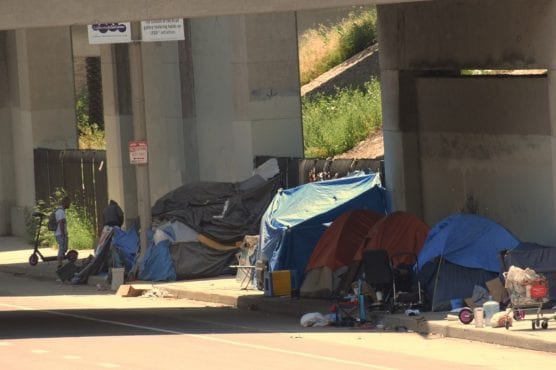LOS ANGELES — Los Angeles will increase homeless bed space by 6,000 in the next 10 months as part of an agreement between city and county governments who are being sued in federal court over a lack of progress on the growing population of people living on the streets.
This past January, L.A. County saw a nearly 13% increase in its homeless population and a 14% increase within the city, totaling more than 66,000 people living on the street in the unincorporated areas of the county. The data was gathered at the beginning of the year and reporter earlier this month, but does not factor any of the economic fallout from COVID-19.
Both the city and county were sued in federal court by an alliance made up of business owners, downtown residents and formerly homeless residents, due to inaction on the homelessness crisis.
Last month, U.S. District Judge David Carter, who was specifically requested to oversee the case by the plaintiffs, issued a preliminary injunction to remove all homeless people living under or near freeways.
The order caused tense negotiations between city and county officials as a one-week deadline was issued by Carter to provide adequate shelter and humanely remove all the people living in encampments near freeways. In court filings, city and county officials argued about who would pay for the services needed to house the several thousand people who would be moved.
On Thursday, the county and city filed a joint agreement that would resolve Carter’s injunction order, but leaves the door open for it to be reinstated if the parties cannot meet important deadlines to build over 6,000 new beds for the homeless population in the next 10 months.
As part of the agreement, L.A. County will pay the city $60 million per year for 5 years to build the new beds and services. An additional 700 beds will be built in the following 8 months and would prioritize vulnerable communities who are homeless like the elderly, but also those who live in freeway encampments.
The city will receive a one-time bonus of $8 million for homeless services if city officials are able to build 5,300 new beds in the next 10 months.
According to U.S. District Judge Andre Birotte, who is sitting as mediator in the case, the parties came to the agreement during a two-day conference that became tense at times.
“The agreement demonstrates a commitment on both sides… and its hopeful that this will be a template for broader discussions as we move forward with this litigation,” Birotte said during a status conference hearing.
Carter described the process as “starting to turn a huge ship in a positive direction” but said a lot of work still needs to be done if the governments want to start being proactive with the homeless population.
“Wouldn’t it be wonderful… if we could approach people who are homeless and persuade them of something better?” Carter asked the room full of government officials at the Alexandria Ballroom, an off-site location chosen to allow for physical distancing. “A shower, a shave, a meal. Wouldn’t that be wonderful as a starter?”
He also described an unintended inertia that was in place when it came to the homeless crisis by local government agencies. Carter said it had “nothing to do with nonbelief in each of the individual leaders.”
Carter commended the parties for reaching an agreement but the larger lawsuit remains in place.
Plaintiff’s attorney Elizabeth Mitchell said, “We’re seeing the numbers increase constantly. Everyone wants to talk about this FEMA-like crisis but nobody is doing anything about it.”
L.A. Mayor Eric Garcetti said in court the efforts being made in the agreement could lead to a reduction in the homeless population.
In court, Garcetti said, “Our commitment is to stretch beyond our reach.”
Outside the hearing, Garcetti told reporters he was optimistic because the commitment of hundreds of millions to fund homeless services and transition people from shelters to permanent housing would have to make a dent in the homeless numbers.
“But God help us if that isn’t enough,” Garcetti said. “If it isn’t enough then the problem is bigger than any program can face.”
Like this:
Like Loading...
Related





 Tweet This
Tweet This Facebook
Facebook Digg This
Digg This Bookmark
Bookmark Stumble
Stumble RSS
RSS


























REAL NAMES ONLY: All posters must use their real individual or business name. This applies equally to Twitter account holders who use a nickname.
0 Comments
You can be the first one to leave a comment.